We're movingpublished at 04:07 GMT 12 December 2023
We're moving our live coverage to a new page, do join us here.
Israeli tanks are moving further into Gaza's southern city of Khan Younis, with Israel ordering civilians to flee the centre
A hospital director in the city says staff are struggling to cope with the volume of casualties, and medical supplies, food, water and fuel are running low
Intense air strikes have been seen in northern Gaza, while Palestinian rocket fire has targeted southern and central Israel
Hamas has threatened that not a single hostage will be allowed to leave Gaza alive unless its demands for a prisoner exchange are met
Israel’s Prime Minister Benjamin Netanyahu says dozens of Hamas members have surrendered and it is “the beginning of the end” for the group
The UN's Palestinian refugee agency says there is "almost a total breakdown of civil order" around its aid deliveries in southern Gaza
Hamas attacked Israel nine weeks ago - killing 1,200 people and taking 240 hostages, some of whom were released during a short-lived truce
The Hamas-run health ministry in Gaza has said Israel has killed about 18,200 people in its retaliatory campaign
Edited by Patrick Jackson
We're moving our live coverage to a new page, do join us here.
Patrick Jackson
Live page editor
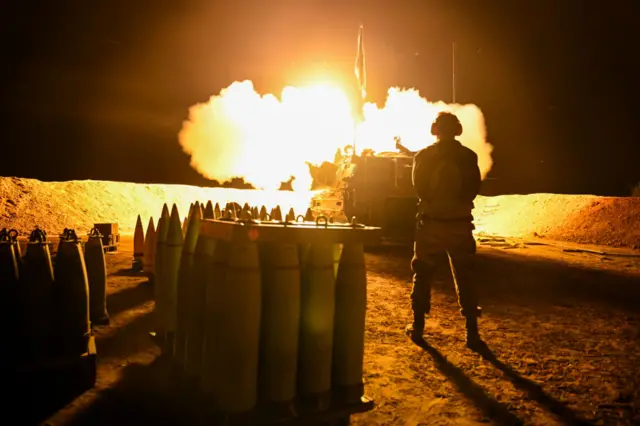 Image source, Getty Images
Image source, Getty ImagesIsraeli artillery firing towards Gaza on Monday
It is just gone 00:30 here in London and 02:30 in Gaza where we can hear the occasional thud of an explosion on a live video feed, set up across the boundary in Israeli territory.
Many civilians in Gaza have gone to bed hungry after another day of serious shortages of food, water and medicine, while Israel stepped up its bombardment of targets both in the north and south of the territory.
Israeli tanks moved towards the centre of the southern city of Khan Younis, where hundreds of thousands of Gazans have sought shelter. Israel has now told them to move to al-Mawasi but international aid organisations criticise the call, since the area is a small strip of land with few buildings and no infrastructure to provide for basic human needs.
The rest of the Gaza Strip is on the brink of a "total breakdown of civil order" when it comes to the delivery of limited humanitarian aid, the UN’s agency for Palestinian refugees says.
At least 18,000 people have been killed in Gaza, according to the Hamas-run health ministry, since 7 October when Hamas launched its devastating surprise attack on Israel.
Israel's Prime Minister Benjamin Netanyahu says Hamas fighters have been surrendering to IDF forces and it is the "beginning of the end" for the group which has controlled Gaza for years. However, one military analyst speaking to the BBC described the claim as “wildly optimistic”.
The UK and the EU said they were planning to impose sanctions on Israelis responsible for violence against Palestinians in the West Bank. Violent attacks there, including fatal shootings of Palestinians by armed Jewish settlers, have risen sharply.
And protests over the war go on, with pro-Palestinian demonstrators in Chile demanding a ceasefire outside the US embassy in the cpaital, Santiago.
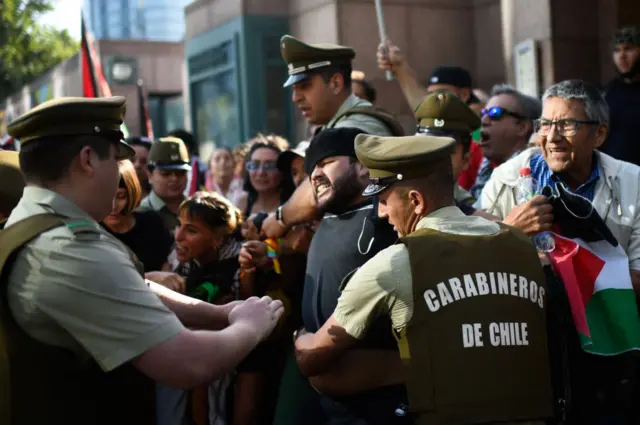 Image source, Getty Images
Image source, Getty ImagesPolice in Chile hold off protesters demanding a ceasefire outside the US embassy in Santiago
Mary O’Reilly and Haya Al Badarneh
BBC 100 Women
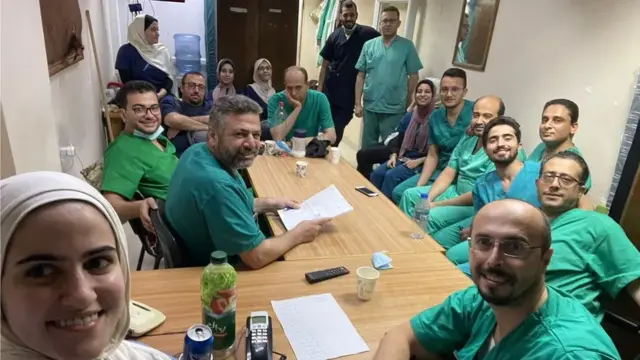 Image source, SARA AL-SAQQA
Image source, SARA AL-SAQQASara al-Saqqa, bottom left, became Gaza's first woman surgeon
When Sara al-Saqqa graduated in August, she made history, becoming Gaza's first woman surgeon.
Saqqa had been working at Gaza's biggest hospital, Al-Shifa, in Gaza City, since she graduated.
On 7 October, she started hearing bombings and was immediately called in to work.
From the start, the staff were overwhelmed by the sheer volume of people "with severed limbs due to shrapnel and different types of injuries caused by intense burning".
When Israel had told Gazans to evacuate the north, Saqqa decided to stay.
As conditions quickly got worse, the hospital struggled to get basic supplies.
"I felt horrible being absolutely helpless," she says. "I always did the best I could with barely anything left to treat them with, but it broke me, not being able to save so many innocent lives."
You can read the rest of the story here.
Israeli hostages who were kidnapped by Hamas and taken to Gaza were drugged to keep them docile in captivity and some were subjected to sexual abuse, according to a doctor treating some of those who have been released.
Renana Eitan, director of the psychiatric division of the Tel Aviv Sourasky Medical Centre-Ichilov, said "the physical, the sexual, the mental, the psychological abuse of these hostages that came back is just terrible".
"I've never seen anything like that" in 20 years of treating trauma victims, she said.
"One of the girls was given ketamine for a few weeks," she added. "It's unbelievable to do this to a child."
Children were separated from their families, and one patient told Eitan that several hostages had been held in total darkness for more than four days.
"They became psychotic, they had hallucinations," Eitan added.
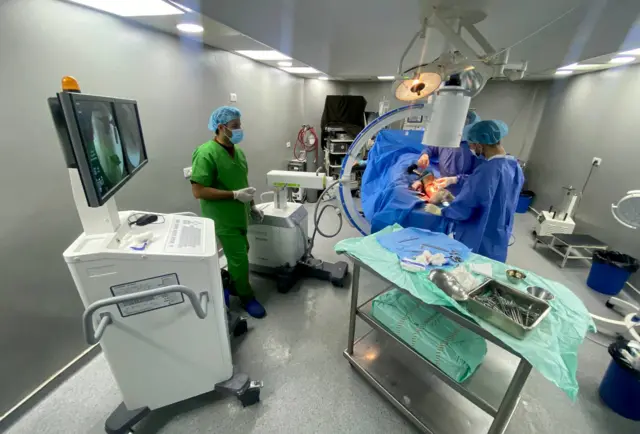 Image source, Anadolu via Getty Images
Image source, Anadolu via Getty ImagesAl-Awda is one of the last remaining functional hospitals in northern Gaza (image from last month)
A surgeon working for the Doctors Without Borders (MSF) was shot and injured on Monday inside Al-Awda Hospital in northern Gaza, the international medical care charity says.
The surgeon was reportedly shot from outside the facility, which MSF says, external is surrounded by snipers "firing on those inside".
"Al-Awda has been under total siege by Israeli forces since 5 December," MSF Ireland's office says.
Mohammed Salha, a manager at al-Awda, was earlier quoted by Reuters news agency as saying that Israeli forces had been besieging the facility for days with tanks, shooting people trying to enter or leave.
An Israeli military spokesperson said the army followed international law and took "feasible precautions to mitigate civilian harm", Reuters reports.
The military has also accused Hamas of using medical facilities - a claim denied by the Palestinian group fighting Israel.
 Riyah Collins
Riyah Collins
BBC Newsbeat
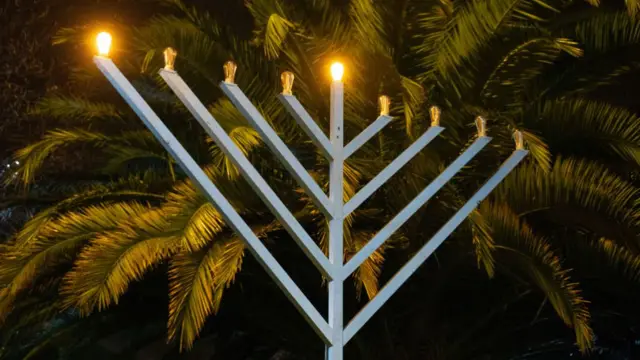 Image source, Getty Images
Image source, Getty ImagesIt’s the time of year when Jews celebrate the festival of Hanukkah, but some university students say celebrations are different this year.
Campuses have been seeing protests and antisemitic incidents since the latest outbreak of the Israel-Gaza conflict.
In the US, a university president quit after refusing to say whether students who called for the genocide of Jews would be punished, later apologising for her comments.
"Traditionally, this would be done in the open, large groups and gatherings," says Samuel, treasurer for Swansea University's Jewish Society.
"But given the current situation, it's very much being done in a quiet way."
When BBC Newsbeat attended a Hanukkah event at the university on Sunday, there was a security presence visible.
Samuel says there have been recent protests in which "all Jews, all Israelis" were called "terrorists".
Fellow student Emily tells Newsbeat, "It’s difficult to feel safe practising Judaism."
"We've had comments and stickers posted around campus, around town saying things along the lines of 'Israelis should die'," she says.
She feels protests are "completely legitimate", but they can take a turn for the worse.
Emily also has a Star of David bracelet which she feels the need to hide in order not to be a "target".
"It's weird to have to hide a big part of your identity," she says.

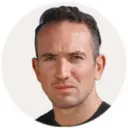 Hugo Bachega
Hugo Bachega
Middle East correspondent, in Jerusalem
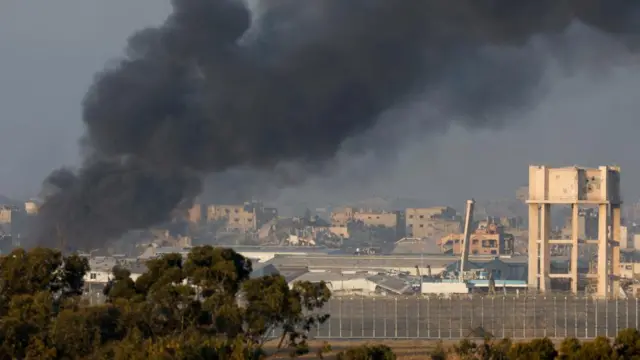 Image source, Reuters
Image source, ReutersSmoke rises inside the Gaza strip following an air strike
As the Israeli military advances across Gaza, saying it is targeting areas described as Hamas strongholds, Israel’s Prime Minister Benjamin Netanyahu has described the moment as the “beginning of the end” of the group, without providing evidence of that.
Netanyahu has repeatedly said the goal of the war is to eliminate Hamas - Israeli authorities say around 7,000 members have been killed so far – and to secure the release of more than 130 people who remain in captivity, after being kidnapped in the 7 October attacks.
Over the weekend, Israeli media reported that officials believed intense operations in Gaza were likely to continue for two more months. It is not clear whether Israel will have all that time. Probably not. Large numbers of Palestinians are being killed every day while the severe humanitarian crisis is quickly worsening.
Aid agencies warn that those who have not been killed by bombs may not survive hunger and disease. Israel is already under international pressure to do more to protect civilians - even from the US, its main ally. Calls for a ceasefire will, at some point, become too loud to be ignored.
Israel will be able to dismantle Hamas’s infrastructure across Gaza, but the group’s ideology is likely to resist. Amid images of widespread destruction and suffering, Qatar’s Prime Minister Sheikh Mohammed bin Abdulrahman Al Thani has given a warning: the war risks radicalising an entire generation across the Middle East.
US State Department spokesperson Matthew Miller said the US found the images of Palestinian men stripped to their underwear, allegedly surrendering guns, as “deeply disturbing”.
Earlier today, Israeli PM Benjamin Netanyahu said dozens of Hamas fighters were "laying down their weapons and handing themselves over".
Images of detained and stripped Palestinians apparently surrendering some weapons to Israeli forces in the Gaza Strip prompted speculation about the circumstances of the events and the filming.
Miller said: “So those images were - we found those images deeply disturbing. And we are seeking more information both about the nature of the images and, of course, why they're public in the first place."
BBC Verify has examined the footage. You can read the full BBC Verify analysis here.
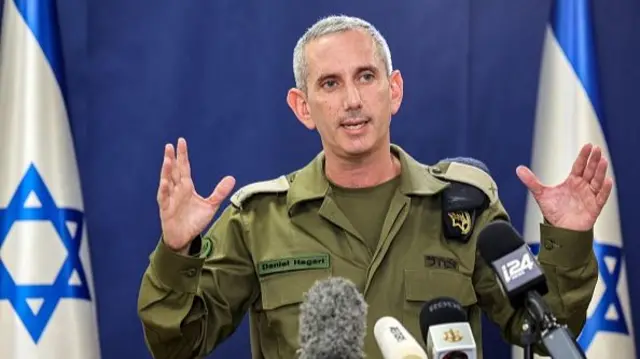 Image source, AFP
Image source, AFPDaniel Hagari, a spokesman for the Israel Defense Forces (IDF), has given an update on its operations in Gaza, saying its military have been "intensifying" attacks on Hamas strongholds in the Gaza Strip.
He said the IDF will focus on locating Hamas strongholds in Khan Younis, and will continue to "apply military pressure until they dismantle Hamas’s infrastructure" in the city.
The Israeli military has issued evacuation orders in the central part of Khan Younis in Gaza's south, urging civilians to move closer to the Egyptian border.
Hagari said more than 500 members of Hamas and Islamic Jihad groups have been arrested across the Gaza Strip in the last month, 140 of whom were arrested after the seven-day-long truce ended.
He echoed earlier comments from Israeli PM Benjamin Netanyahu, and said that some Hamas operatives have been surrendering.
"We arrest those who need to be arrested and release those who are not terrorists, removing them from the area southward to areas where civilians can stay," Hagari said.
As the war between Israel and Hamas continues, some people in Gaza who were displaced from their homes due to the fighting have found shelter in tents. Elsewhere, Israelis and Palestinians have attended funerals and buried their loves ones killed in conflict.
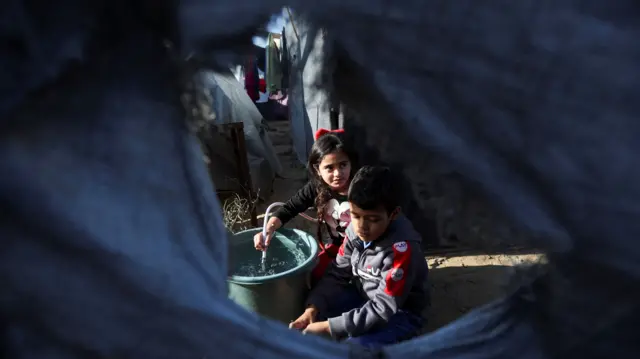 Image source, Reuters
Image source, ReutersDisplaced Palestinian children shelter in a tent camp in Kahn Younis, southern Gaza
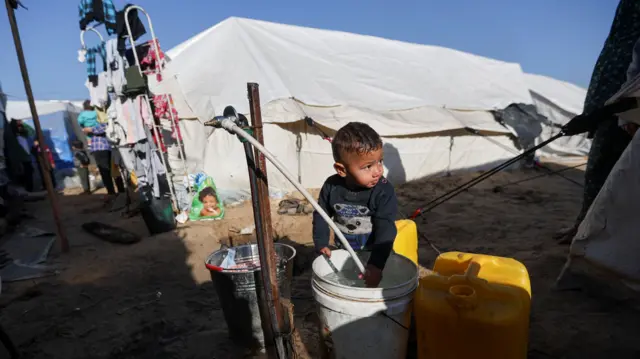 Image source, Reuters
Image source, ReutersA Palestinian boy, who fled his house due to Israeli strikes, also shelters in a tent camp in Kahn Younis
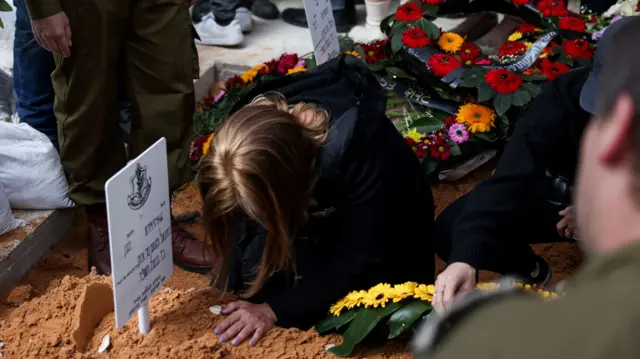 Image source, Reuters
Image source, ReutersA woman touches the ground at the funeral for Israeli Sergeant major Gideon Ilani, killed in Gaza
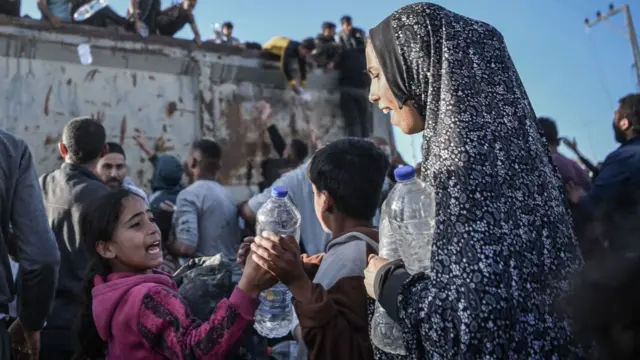 Image source, Getty Images
Image source, Getty ImagesPalestinians flock to a truck carrying drinkable water in Rafah, southern Gaza
Israeli authorities have said the Kerem Shalom crossing between Israel and Gaza will open tomorrow for aid inspections in order to allow more supplies to enter Gaza.
This "will double the volume of aid" delivered admitted into the territory, Israel's Coordinator of Government Activities in the Territories (Cogat) said in a post on X.
Until now, Israel has inspected aid trucks at Nitzana, 25 miles (40km) south along the Egyptian-Israeli border, before they travel into to Gaza via the Rafah crossing between Egypt and Gaza.
Kerem Shalom will be used only to screen aid trucks to speed up the process - the aid will still enter via the Rafah crossing.
Earlier, Philippe Lazzarini, the head of the UN agency for Palestinian refugees (Unrwa), spoke of the urgent need of a ceasefire to ensure "meaningful aid" is delivered to Gaza.
Speaking to the UAE-based The National , externalnewspaper, Lazzarini said the needs in Gaza where "absolutely immense" and "what comes in still remains a crumb compared to the needs of the people".
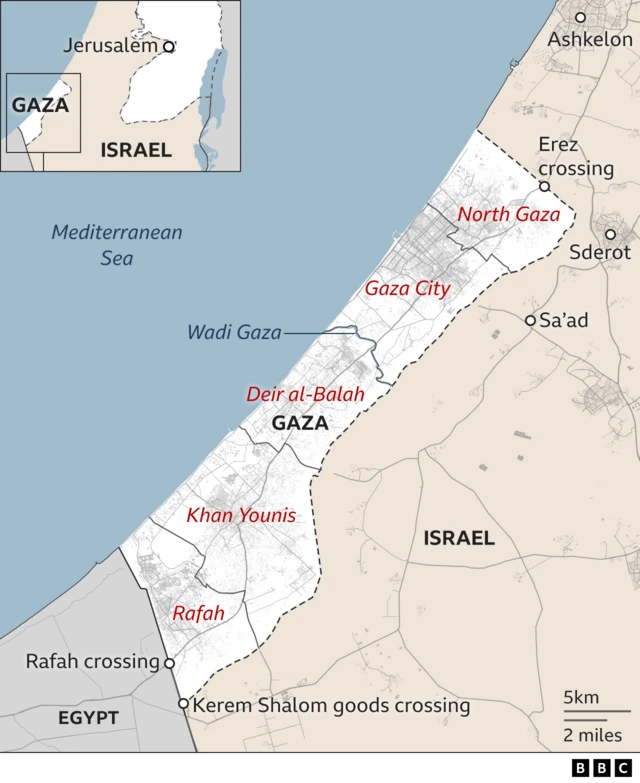 Image source, .
Image source, .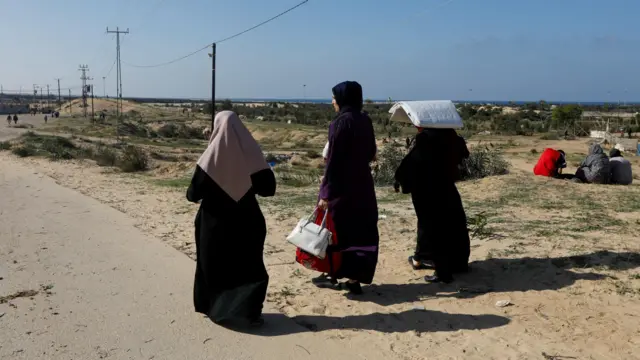 Image source, Reuters
Image source, ReutersThe fighting in Gaza has left hundreds of thousands of people displaced and facing severe shortages of basic necessities
Women and girls in Gaza who are having their periods are having to use nappies or scraps of cloth because they can't get hold of sanitary products, women have told the French news agency AFP.
"I cut up any piece of cloth I find, and I use them like sanitary towels for my period," said Hala Ataya, who says she had to leave Jabalia refugee camp in northern Gaza and fled to the southern city of Rafah.
"There's no security, no food, no water, no hygiene. I'm ashamed, I feel humiliated," said Samar Shalhoub, 18, who was displaced from Gaza City.
Shalhoub has been using rags instead of hygienic pads and says she has suffered skin infections as a consequence.
Another displaced woman in Rafah, Umm Saif, said her five daughters were "all using Pampers" for their periods.
Action Against Hunger says that many women's clothes were stained with menstrual blood and they were "using period products for longer than anticipated, increasing the risk of infection".
White House national security spokesman John Kirby has told reporters that the US is "certainly concerned" about reports that Israel has used white phosphorus, supplied by America, in southern Lebanon.
"We'll be asking questions to try to learn a little bit more," John Kirby told reporters, speaking aboard the presidential plane Air Force One.
It follows a report in the Washington Post today, external, about an incident in October which Amnesty International said injured nine civilians and should be investigated as a war crime, external.
Kirby said white phosphorus has a "legitimate military utility" and that "obviously, any time that we provide items like white phosphorous to another military, it is with the full expectation that it will be used in keeping with those legitimate purposes".
White phosphorus munitions can legally be used on battlefields to make smoke screens, generate illumination, mark targets or burn bunkers and buildings.
But they can also be extremely harmful, causing severe burns.
A protocol to the 1980 Convention on Conventional Weapons bans the use of white phosphorus as an incendiary weapon against civilian populations or in air attacks against enemy forces in civilian areas.
According to Reuters, Israeli Defense Minister Yoav Gallant was asked about the report and responded: "The IDF and the entire security establishment acts according to international law."
Israeli Defense Minister Yoav Gallant has said that Israel had no intention of staying permanently in the Gaza Strip and that it was open to discuss alternatives about who would control the territory, as long as it was not a group hostile to Israel.
Gallant said hundreds of Hamas operatives in Gaza have surrendered or been arrested in recent days, including people who participated in the 7 October attacks.
“We have encircled the last strongholds of Hamas in Jabaliya and Shejaiya, the battalions that were considered invincible, that prepared for years to fight us, are on the verge of being dismantled,” the Times of Israel quoted him as saying.
"Those who surrender will be treated in one way, and those who do not surrender will be treated in another way," he added.
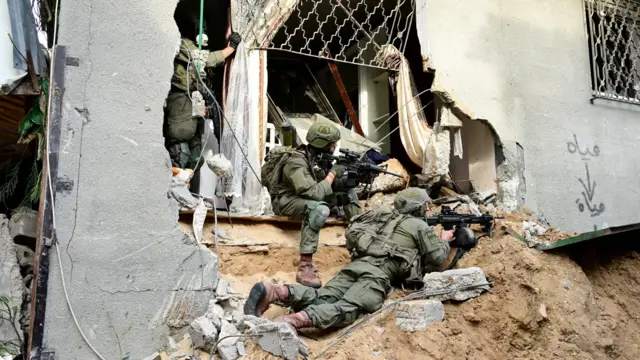 Image source, Reuters
Image source, ReutersIsraeli soldiers pictured operating in the Shajaiya district of Gaza City on Sunday
Benny Gantz, a member of the Israeli war cabinet, has spoken to the US Secretary of State Antony Blinken tonight about the "heightened aggression and increased attacks by Iranian-backed Hezbolllah" on Israel.
He said Israel must remove the threat from the civilian population of northern Israel.
He called on the international community to act to ensure that “the State of Lebanon stops such aggression adjacent to the border", Gantz wrote on X, external, formerly Twitter.
Since the Hamas attacked Israel on 7 October and Israel began retaliatory strikes on Gaza, Hezbollah has frequently targeted Israel from across the border in Lebanon. Hezbollah is politically influential and in control of the most powerful armed force in Lebanon, and is a staunch supporter of Hamas.
Gantz also thanked Blinken for the US veto of Friday's UN Security Council resolution calling for an immediate humanitarian ceasefire in Gaza.
Mahmoud al-Ajrami
BBC Arabic cameraman, reporting from Rafah, southern Gaza
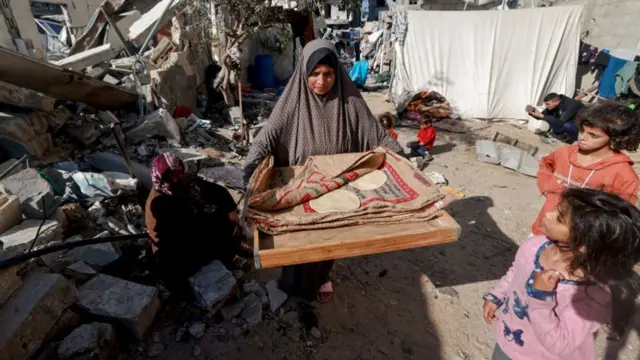 Image source, AFP
Image source, AFPA woman carries bread next to destroyed houses in Rafah on the southern Gaza Strip
Everywhere is overcrowded here in Rafah city in the south of Gaza. There are no proper shelters available for families who have newly arrived.
People have been setting up makeshift tents on any piece of scrubland around the city. The tents here are even flimsier and more tattered than they were in Khan Younis. It’s unclear whether they’d survive the rain or cold.
Huge numbers of people are also crowding around centres set up by the UN Relief and Works Agency (Unrwa), where bags of flour are distributed to residents and displaced families. The centre is open every day from 07:00 to 14:00 local time.
As I waited to get flour for my family, people were growing angry, desperate to get flour as they cannot afford to buy any bread.
The Palestinian Red Crescent is also setting up a huge field hospital in Rafah in case the number of people wounded in air strikes starts to overwhelm the main hospital.
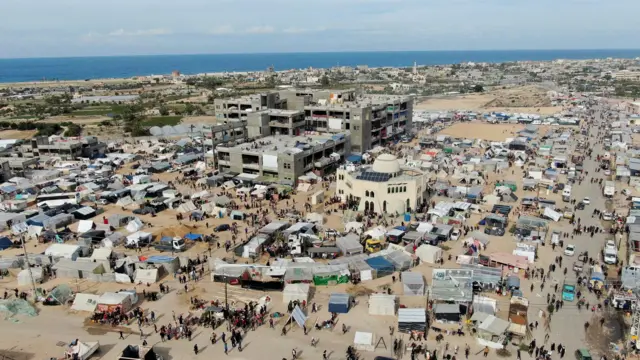 Image source, Reuters
Image source, ReutersIsrael has urged Gazans to flee towards Rafah from some parts of the southern city of Khan Younis
Muhannad Tutunji
BBC Arabic, reporting from Ramallah
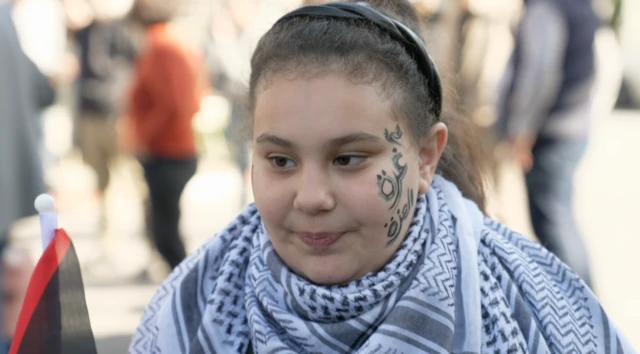
I’ve been talking to young Palestinians in Ramallah in the occupied West Bank, where hundreds of protesters have gathered on the streets around its landmark al-Manara Square.
They’re taking part in a global strike called for by pro-Palestinian trade unions and grassroots groups to demand a ceasefire in Gaza.
One girl, with the slogan “Gaza Pride” painted on her cheeks in Arabic and wearing a traditional keffiyeh headdress around her shoulders, told me she was marching to stop the war and so that girls as young as her would not be killed.
Other slogans included “National Unity”, as Palestinians here expressed their solidarity with those in the Gaza Strip.
There were also flags and banners displaying support for Fatah, the leading political faction in the Palestinian Authority, as well as for Hamas, which led the 7 October attack on Israel and is designated a terrorist group by the UK, US, EU and other powers.
Another protester, who like many of those present didn’t want to be named, told me that he not only wanted to show his anger at the Israeli authorities, but also at the United States, which vetoed a UN resolution calling for a ceasefire.
Politics here is often dominated by men, so what stood out for me was the number of children attending. Some, too young to walk, were carried on the shoulders of their mothers and fathers.
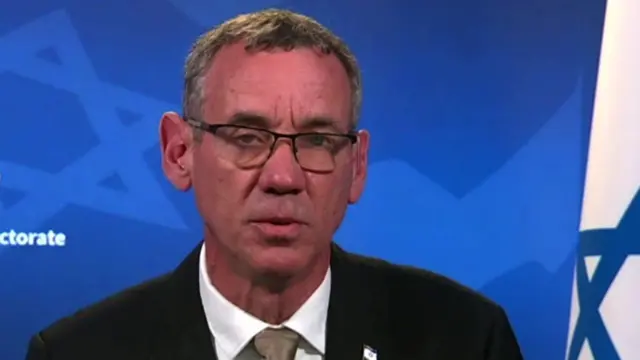
Senior adviser to the Israeli prime minister Mark Regev
Mark Regev, senior adviser to Israel's prime minister, told the BBC earlier that “hitting them [Hamas] hard” with military pressure is the best way to get the remaining 135 Israeli hostages released.
“[Hamas] release hostages because they are desperate for time out in the fighting,” he says.
Mediator Qatar has said the bombardment of Gaza means the window for a new truce is narrowing, but Regev says this is “wrong", adding that the only way to facilitate the release of hostages is military pressure.
He says Israel has "grave concerns about hostages who remain captive with Hamas", referencing how Hamas "brutalised and raped" civilians during the 7 October attacks.
Regev adds that Israel has designated “humanitarian safer” areas on maps and says “the people of Gaza know where these areas are" - though Gazans have said they struggle to access online maps with intermittent internet coverage, while aid agencies say nowhere is safe in Gaza.
Israel has called for specific areas of Khan Younis to be evacuated, but not the city in its entirety.
Regev says Israel disagrees with diplomatic calls for a ceasefire because that would mean “Hamas stays in power” and “Hamas has said the 7 October attacks would happen again".
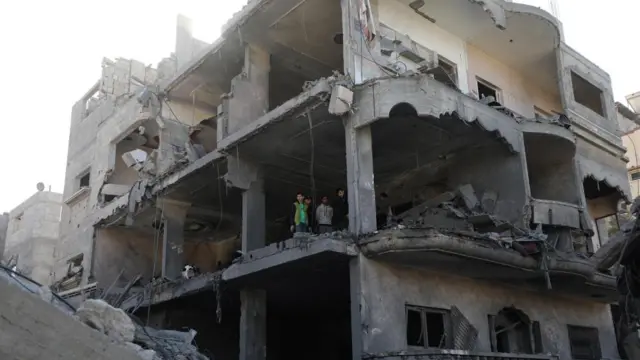 Image source, EPA
Image source, EPAPalestinians inspect the rubble of a destroyed house following Israeli airstrikes on Al Maghazi refugee camp, southern Gaza Strip
As the Israel-Hamas war enters its third month, fierce battles are continuing in the Gaza Strip. Here are some of the key developments from today:
As we've just reported, the UK government has suggested it is preparing to impose sanctions on Israeli settlers responsible for violence against Palestinians in the West Bank settlers.
Now, the European Union says it will propose to member states that they should impose sanctions on extremist settlers who commit acts of violence against Palestinians in the West Bank, the EU's foreign affairs chief Josep Borrell told reporters following a meeting of EU foreign ministers in Brussels.
Attacks have surged in the West Bank since the start of the war in the Gaza Strip, triggered by Hamas's assault on southern Israel on 7 October.
Violent attacks, including fatal shootings of Palestinians by armed Jewish settlers in the West Bank have risen sharply. So many attacks are happening that Israel's closest allies, including the United States and the United Kingdom, have condemned violence by extremist settlers and demanded that those guilty of crimes should be prosecuted.